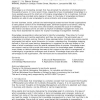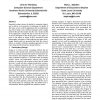1916 search results - page 250 / 384 » The Dea[r]th of Human Understanding |
KBS
2000
14 years 9 months ago
2000
Knowledge is an interesting concept that has attracted the attention of philosophers for thousands of years. In more recent times, researchers have investigated knowledge in a mor...
EXPERT
2002
14 years 9 months ago
2002
er than abstracting human behavior as work processes or tasks--functional idealizations of the work to be accomplished--we model people's activities comprehensively and chrono...
122
click to vote
SIGCSE
2002
ACM
14 years 9 months ago
2002
ACM
Empirical evidence shows the ability for computer technology to deliver on its promises of enhancing our quality of life relies on how well the application fits our understanding ...
AAAI
2007
15 years 10 days ago
2007
A traditional goal of Artificial Intelligence research has been a system that can read unrestricted natural language texts on a given topic, build a model of that topic and reason...
101
click to vote
BMCBI
2007
14 years 10 months ago
2007
Background: Human genetic variations primarily result from single nucleotide polymorphisms (SNPs) that occur approximately every 1000 bases in the overall human population. The no...


